

EXECUTIVE SUMMARY
LETTER FROM THE LEADERSHIP
MEET OUR FELLOWS
EVENTS
RESEARCH AND TEACHING
IMPACT
GROWTH IN NUMBERS
FUNDING AND GRANTS

CONTACT



EXECUTIVE SUMMARY
LETTER FROM THE LEADERSHIP
MEET OUR FELLOWS
EVENTS
RESEARCH AND TEACHING
IMPACT
GROWTH IN NUMBERS
FUNDING AND GRANTS

CONTACT
Based within the Jeb E. Brooks School of Public Policy, the Brooks Tech Policy Institute (BTPI) is the home of technology policy and national security research at Cornell University. Our multidisciplinary research team is comprised of 33 fellows who work at the highest levels of decision-making – from the White House to the Pentagon, the United Nations to NATO – utilizing academic expertise to advise on critical issues of national and internationalimportance.
Our mission is to build robust policies that help unlock the potential of AI & 4IR technologies, while mitigating emerging threats to security. By partnering with industry, government, and international policy leaders, we leverage our research to solvecomplexnationalsecurityandtechpolicychallenges.
This annual report documents 12 months of record growth for BTPI during the academic year 2023/24. It highlights our expanding portfolio of funded research projects on robotics, crypto, AI, and cyber security; our growing team of experts; our collaborative work with industry, government, and defense; and our academic and professional education provisions that have enhancedourgrowingintellectualcommunity.
Building on these firm foundations, 2024/2025 looks to be an even stronger year for BTPI. Generously funded by a $3 million grant from the U.S Department of Defense, January 2025 will see the establishment of our new ‘US Semiconductor Research Hub’. This is the first of our planned research hubs, with four more,focusedon‘DronesandRobotics’,‘AIGovernance’,Crypto Currencies’,and‘CyberSecurity’,settolaunchin2025.
“
We cannot safely unlock the potential of AI and other emerging technologies without developing wellresearched, responsible policies.
- SARAH KREPS

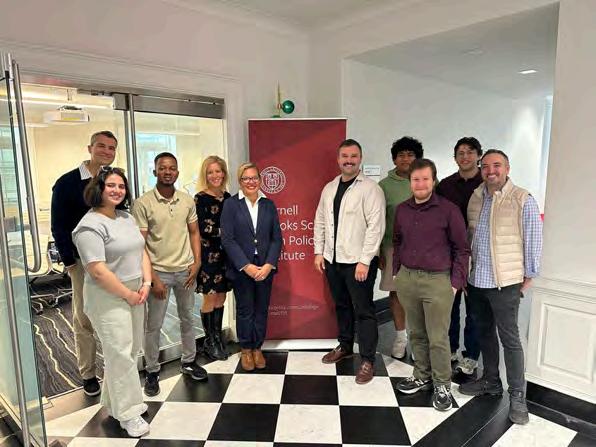
DearFellowsandFriendsoftheCornellBrooksTechPolicyInstitute(BTPI),
As we look back on the past year, we are filled with pride for what has been a truly transformative period for BTPI. In 2023/24, we secured new funding that empowered us to expand our research, amplify our policy impact, and foster thought leadership in critical areas of technology policy and national security. We also welcomed an exceptional group of new team members – five new junior fellows, five new fellows, and seven new senior fellows – each of whom bring diverse expertise and a shared passion for shaping tech and security policy. Together, our growing multidisciplinary team is poised to address some of the most pressing challenges of our time, from cryptocurrency and financial freedomtodronetechnologiesandtheneedforAIgovernance.Itisoffthebackofthissuccessthatour team has delivered increased policy engagement and academic impact. Alongside our 17 events and four new academic modules, our fellows have advised international governmental organisations, NGOs, departments of state, and industry leaders, all while publishing in prestigious research journals, and commentingforleadingmediaoutlines(suchasCNN,theNewYorkTimes,andtheWashingtonPost).
Our success is a testament to the collaboration and commitment of our partners, funders, and dedicated staff. As we move forward, we are excited to build on this momentum, advancing BTPI’s mission to unlock the potential of AI & 4IR technologies with robust and responsible policies. 2024/25 is already looking to be an exciting year with future projects on semiconductors, the geopolitics of weapons proliferation, cyber security, quantum technologies, and the civilian and military applications ofAIinthepipeline.
As such, thank you all for being a part of our journey and we very much look forward to another impactfulyearwithyourcontinuedpartnershipandsupport.
Withwarmregards,

Sarah Kreps Director and Founder

James Patton Rogers Executive Director
Ourteamiscomprisedof33fellowsdrawnfromCornell’s world-leadingresearchenvironmentandexternalcentresof academic,industry,andpolicyexcellence.
“

We pride ourselves on our shared ethos of cross-disciplinary and applied research.
- JAMES PATTON ROGERS
Our experts are drawn from academic disciplines integral to the in-depth analysis of defense and technology issues. These include public policy, computer science, mechanical and aerospace engineering, political science, history, civil and environmental engineering, law, electrical and computer engineering, information science, and chemical and biomolecular engineering. It is this unique grouping of expertise that provides us with the knowledge base required to react quickly and address rapidly developing technology and security issuesinadynamicandincreasinglycontestedworld.
Senior Fellows are nationally and internationally recognised leadersintheirfield.Theyareeithertenuredmembersoffaculty at Cornell or are respected members our policy, military and industrycommunity.
Fellows are the rising stars of their respective fields. They are either graduate or postgraduate researchers who have a proven trackrecordofproducingtop-tierresearch.
Junior Fellows are recruited from Cornell’s highly motivated, academically strong, and talented community of undergraduate scholars. They have shown great initiative, achieved excellence intheiracademicstudies,andapplytheirskillsthroughresearch andadministrativesupportwithinBTPI.


Dr. Doug Kriner
Senior Fellow
American Political
Institutions

Dr. Jillian Goldfarb
Senior Fellow
Sunstainable Energy and Environmental Impact

Dr. Ricky Clark
Senior Fellow
International Governance and Environmental
Politics

Dr. Gustavo Flores-Macías
Senior Fellow
Economic Reforms and Public
Safety

Dr. Rebecca Slayton
Senior Fellow
Cybersecurity and Governance
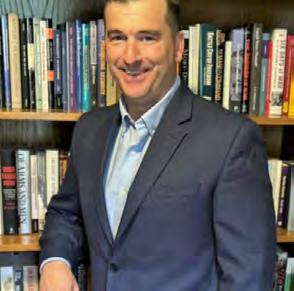
Dr. Keith Carter
Non-Resident Fellow
Strategic Competition and Civil-Military
Relations

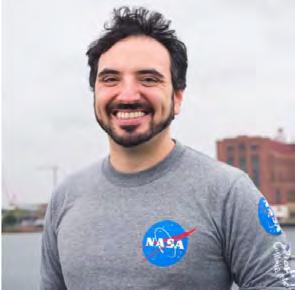
Dr. Gregory Falco
Senior Fellow
Space Cybersecurity

Dr. Paul Lushenko
Non-Resident Senior Fellow
Drone Warfare and Legitimacy

Dr. Qian Yang
Senior Fellow
Human-AI Interaction
Design
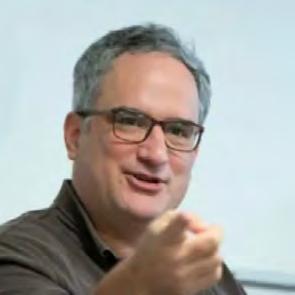
Dr. David Silbey
Senior Fellow
20th-Century Warfare and Insurgency

Judith Germano
Senior Fellow
Cybersecurity and Regulatory Risk

Dr. Christopher Earls
Senior Fellows
Human-Machine
Intelligence Partnerships
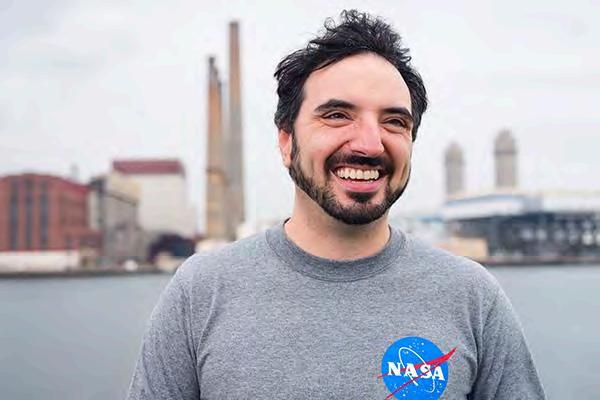
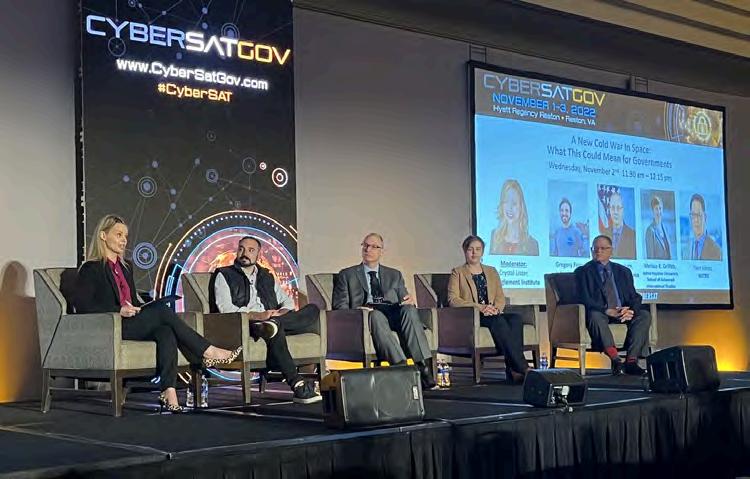
Dr. Falco’s work focuses on protecting US space systems from hacking, cyberattacks, and directed energy weapons. An assistant professor at the Sibley School of Mechanical and Aerospace Engineering, Dr. Falco directs the Aerospace Adversary Lab which aims to enhance space security. The lab’s research focuses on critical infrastructure, satellite systems, artificial intelligence, remote sensing and optical physics. Dr. Falco received his PhD from MIT, where NASA’s Jet Propulsion Laboratory funded his doctoral research in Cybersecurity at MIT’s Computer Science and Artificial Intelligence Laboratory (CSAIL). He currently serves as the founding chair of the working group creating the Institute of Electrical and Electronics Engineers’ Standard for Space System Cybersecurity with over 25 countriesinvolved.HeisalsoNATOcountrydirectorforHEIST,anSPS-backedprogramthat worksonreroutingdatafromsubseacables(thepathfor95%oftheworld’sinternettraffic) tosatcomnetworksintheeventofunderwaterattacks.


Maxwell Norteman
BTPI Directors Fellow
National Security and Human Rights

Dr. Lilly Muller Fellow Politics, Security, and Technology

Dr. Jean-François Bélanger Non-Resident Fellow
Emerging Technologies, Coercive Diplomacy and Conflict Escalation
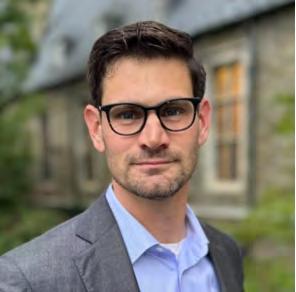
Brett Reichert Fellow
Military Technology and Conflict Dynamics

Basim Ali Fellow
Fintech Policy, Risk Advisory and Strategy Consulting


Amelia Arsenault Fellow
International Relations, AI and Surveillance
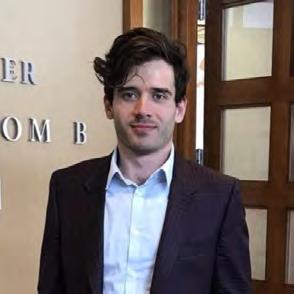
Dr. Jon McCandless Fellow
Defense, Industrial Policy, Semiconductor Research

Dr. Julie George Fellow
International Security, Conflict and Cooperation

Avishai Melamed Fellow
Politics of Technology, Science and Diplomacy, International Cooperation and Competition

Adi Rao
Industry Fellow
National Security, Political Economy, Emerging Technologies
Dr. Jon McCandless, a BTPI Fellow, is the founder and CEO of Gallox Semiconductors, the only Gallium Oxide startup in the United States.



Gallium is a crucial element for the semiconductor industry, particularly in the context of the ongoing trade tensions between the US and China. Its importance stems from its use in creating advanced semiconductors like Gallium Nitride (GaN) and Gallium Oxide, which offer significant advantages over traditional silicon-based semiconductors in terms of power efficiency, speed, and thermal management. These materials are vital for emerging technologies such as 5G telecommunications, electric vehicles, and high-efficiency power systems.
Amelia Arsenault is a BTPI Fellow and Doctoral candidate within the Department of Government, specializing in AI, surveillance, and ‘smart city’ technologies.

Artificial Intelligence is increasingly shaping global power dynamics and economic competitiveness, becoming a pivotal factor in international political economy.Asnationscompetefortechnologicalsupremacy,theintegrationofAI raises significant governance challenges, particularly regarding the balance between innovation and the protection of civil liberties. The rise of AI-powered surveillance tools has prompted urgent discussions about privacy and human rights, leading to calls for robust international oversight and regulatory frameworks. Initiatives like AI Safety Institutes reflect a growing recognition of the need for global cooperation in AI governance. It is to these challenges that Ameliadedicatesherresearch.
Amelia’s work has been published in the Oxford Handbook of AI Governance, Journal of Peace Research, Canadian Foreign Policy Journal, and Harvard BusinessReview.ShereceivedaDoctoralgrantfromtheDepartmentofNational Defense Mobilizing Insights in Defence and Security (MINDS) Scholarship InitiativeandtheSocialSciencesandHumanitiesResearchCouncilofCanadato supportherresearch.

Abigail F. Srulevich
Arts & Sciences ‘26

Lucas Galioğlu
Arts & Sciences ‘26
Eeshaan Chaudhuri
Brooks ‘27

Danyal Hyland Hassan
Brooks ‘27
Kayla Schechter
Brooks ‘27

BTPI Junior Fellows, Cynthia Tan and Danyal Hyland Hassan have secured funding for their research from the prestigious Laidlaw Leadership and Research Program. Supervised by BTPI Executive Director, James Patton Rogers, and aided by BTPI fellows Jon McCandless,JudithGermano,DougKriner,andAmeliaArsenault,Cynthia andDanwereabletoengageinpolicy-focusedresearchoverthesummer months.CynthiaworkedcloselywiththeFBI'sCyberDivisioninNewYork and Dan worked on a NATO SPS-funded project alongside conducting cutting-edge research into semiconductors. In 2025, Laidlaw will fund bothscholarstoconductinternationalresearch.
Bringing together experts from across industry, policy and academia
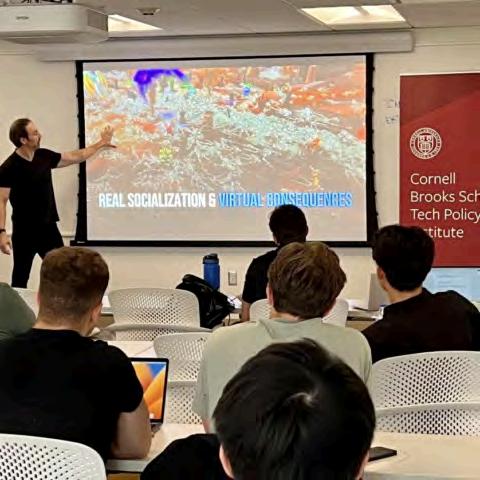
The BTPI Distinguished Speaker Series brings leading academic researchers and thought leaders from policy and industry to the Jeb E. Brooks School of Public Policy.

The BTPI Talk Series offers a dynamic and energetic forum for scholars to share their research with the BTPI community and collaborate on work-in-progress. We also utilize this format to host career talks with prominent and inspiring individuals.
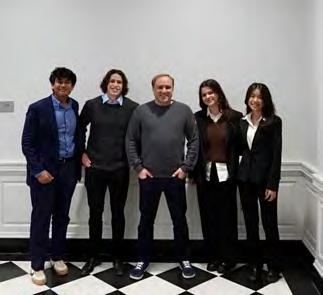
Co-founder of CrowdStrike, Dmitri Alperovitch.
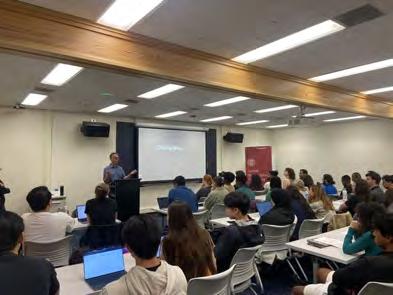
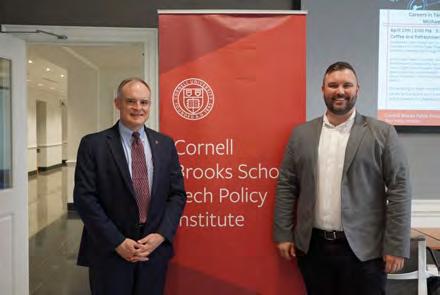
Former
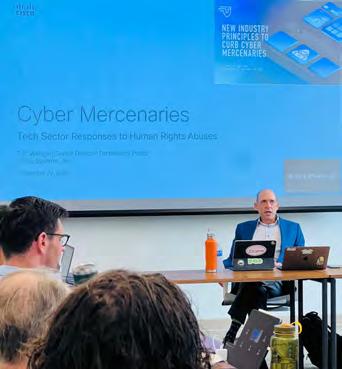
Senior Director for Technology Policy at CISCO, Eric Wenger.
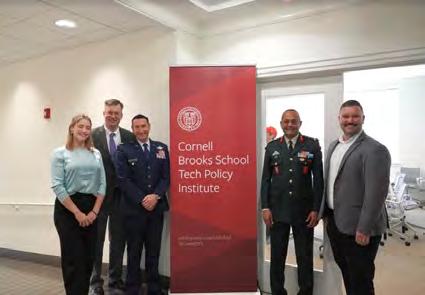

NATO
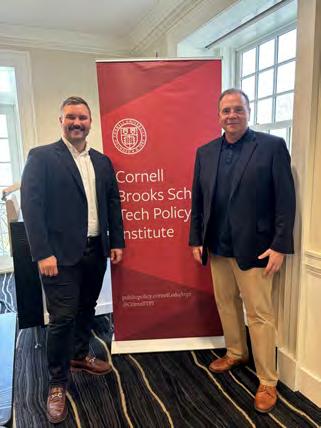



From the governance of AI, to the weaponization of duel use technologies, human machine-interaction to space policy, our fellows have engaged in cutting-edge research at the intersectionoftechnologypolicyandnationalsecurity.
BelowisaselectionofpublicationsbytheBTPITeam,witha focus on the outlets they published in, and the policy organisationstheyworkedwith.
Precision: A History of American Warfare (2023).
DeGruyter Handbook on Drone Warfare (2024).
The Legitimacy of Drone Warfare, (2024).
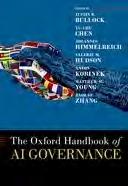

International Journal of Human–Computer Interaction
The Oxford Handbook of AI Governance.
Security Studies
Foreign Affairs
Neural Networks
Space Policy
United Nations Office of Counter
Terrorism
NATO SPS
Brookings Institution
RAND Corporation
UK Parliament
Congressional Select Committee on CCP
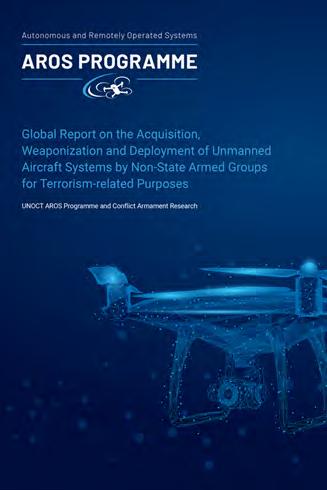

In 2023/4 BTPI introduced two new academic courses within the Jeb E. Brooks School of Public Policy.
The 3 credit full semester courses can be taken by students from across the university, creating a multidisciplinary, diverse, and vibrant learning environment. All courses are built around an active and problem based pedagogical approach and include applied research, class debates, and regular geo-strategic simulations.
Building off consistent positive student feedback, BTPI will launch two new courses in 2025. These will include Contemporary Security Policy, taught at a UG & PG level, and an online e-Cornell certificate in Country Risk Analysis.

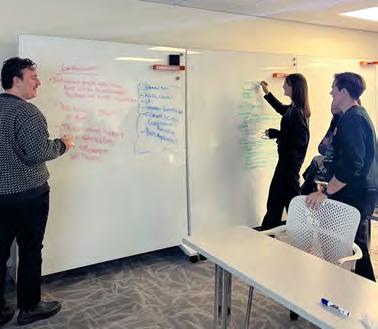
Level: Undergraduate
Convenor: James Patton Rogers

GlobalPolicyChallenges
Level: Postgraduate
Convenor: James Patton Rogers
Contemporary Security Policy & Country Risk Analysis
Forthcoming 2025

The Brooks School Tech Policy Institute (BTPI) undertook a $1M project to study how those living under authoritarian governments secure financial freedom. Led by BTPI Founder and Director Dr. Sarah E. Kreps, the research will use quantitative and qualitative approaches to understand how Bitcoin and stablecoins are used around the world.
Funded by the Human Rights Foundation and Reynolds Foundation, the initiative will create a global adoption index mapping cryptocurrency use across 12 countries—including India, Nigeria, El Salvador, Indonesia, and Turkey. Through surveys and interviews, the research will investigate adoption behaviors on the basis of demographics within each country as well as the perceptions and attitudes towards digital currencies. The project, set to run from 2024 to 2026, aims to guide policymakers, industry leaders, and communities in crafting effective regulatory, educational, and product strategies to enhance financial freedom and inclusion.
“
If you live in a place where the government silences its critics by threatening their assets or where you cannot trust the local banking system, you understand the importance of financial freedom to democracy. We want to study how people in these countries are using Bitcoin and stablecoins in the pursuit of their financial security.
- SARAH KREPS

We want BTPI to continue to be the home of cutting-edge interdisciplinary discussions like this—collaborations that break down traditional barriers across industry, policy, and academia to support NATO and its allies as drone warfare becomes a central threat. And we want to make sure the best minds available are taking up these issues that have farreaching implications for all of us.
- JAMES PATTON ROGERS
In April, the Brooks Tech Policy Institute (BTPI) received a $65,000 grant from the NATO Science for Peace and Security Programme to study the development and use of military drone technologies. This project, a transatlantic partnership between BTPI and CSS led by Patton Rogers and Kunertova, includes a series of advanced research workshops bringing together leading practitioners and experts to analyze factors contributing to the growing use of land, air, and sea drones in the “Third Drone Age.” The ultimate goal is to provide NATO members and partners with strategic insights on developing drone and counterdrone capabilities. The project will run from 2023 to 2025 and will conclude with the publication of the ‘Full Spectrum Drone Warfare’ report, a strategic foresight analysis of emerging drone threats across all domains out to 2040.


BTPI organized policy panels at the 2023 and 2024 Arctic Circle Assemblies titled “Opportunites and Challenges in Increasingly an Ice-Free Arctic” and “Science and (In)Security: Duel-Use Technologies in an Opening Arctic.”
Chaired by BTPI Executive Director, Dr. James Patton Rogers, these panels brought together leading experts to discuss the complex security environment and evolving issue of dualuse technologies in the Arctic region. Senior Fellow Dr.Gregory Falco & Non Resident Fellow Dr. Jean-François Bélanger were featured on the panel.
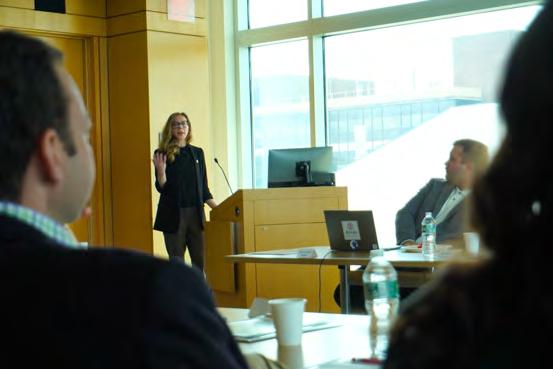
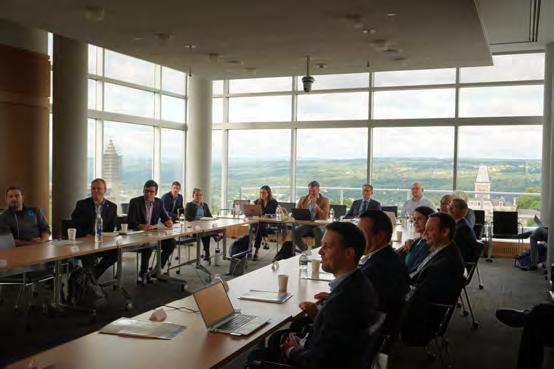
This August, Dr. James Patton Rogers and Dominika Kunertova, Senior Researcher for the Center for Security Studies (CSS) at ETH Zurich, brought leading defense experts together for a workshop entitled “Full Spectrum Drone Warfare 2050: Developments in Drone Deployment Across All Domains.” This workshop was part of a larger 'Full Spectrum Drone Warfare' project, sponsored by NATO Science for Peace and Security Programme which researches how autonomous, automated, and/or remote-controlled drones will be utilized across air, land, and sea out to 2050.

In September of 2023, the Brooks Technology Policy Institute co-hosted a paneldiscussionwiththe Bitcoin Policy Institute attheNationalPressClub in Washington, D.C. entitled “Digital Competition & Strategic Currencies.” The panelists, featuring Dr. Sarah Kreps, discussed the geopolitical role of digital currencies in the context of Western sanctions, US-China competition,anddigitalauthoritarianism.OtherpanelistsincludedMatthew Pines, the Director of Intelligence at Krebs Stamos Group, and Chris Meserole,theDirectorofthetheBrookingsInstitutionArtificialIntelligence andEmergingTechnologiesInitiative.
PERCENT GROWTH IN FELLOWS (FROM 20 TO 33 ) 65%

AVERAGE EVENT ATTENDANCE
TOTAL COMPETITIVE RESEARCH FUNDING $1.3M
369
52 LINKEDIN FOLLOWER GROWTH IN FIRST SIX MONTHS (NEW SITE)
104% X/TWITTER FOLLOWER GROWTH 2023/24
Reynolds and Human Rights Foundation
A collective $1M project to study financial freedom in countries with authoritarian governments, led by BTPI Director Sarah Kreps

General Atomics
Aeronautical Systems, Incorporated (2023)
$70,000 from GA-ASI to study public opinion for the global trade of drones
Microsoft AI
$20,000 towards collaborative research with Microsoft on devising a high-level framework for AI regulation and policy.
Jain Family Institute (2023-2024)
$100,000 to advance research and policy recommendations on digital ethics, including funding for a post-doc researcher.
NATO Science for Peace and Security Programme
$65,000 to analyze the development and use of military drone technologies across air, land, and sea
Planetary Defense Scholarship (2023)
$6,000 from the International Academy of Astronautics to study public opinion on planetary defense.



